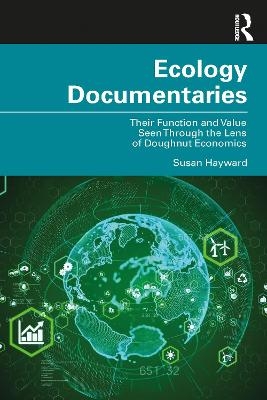
Ecology Documentaries
Their Function and Value Seen Through the Lens of Doughnut Economics
Seiten
2021
Routledge (Verlag)
978-1-032-13162-7 (ISBN)
Routledge (Verlag)
978-1-032-13162-7 (ISBN)
This companion piece to Susan Hayward’s Film Ecology focuses on ecology-documentaries produced since the new millennia.
This companion piece to Susan Hayward’s Film Ecology focuses on ecology documentaries produced in the first 20 years of the new millennium (2000–19).
Using Kate Raworth’s regenerative economic theoretical model as set out in Doughnut Economics, this book examines 57 films emanating from Europe and the 4 areas of concern they raise about energy production, pollution and waste
management, agribusiness, disrupted ecosystems and the migratory f low. These ecology documentaries make explicit the damage done to our planet thanks to growth capitalism and neoliberal globalisation. But they also provide the evidence that solutions to this planetary abuse exist. The book demonstrates how these documentaries reveal the process of humankind’s planetary plundering and explores the structuring of the eco-doc as a new generic type in the domain of documentary practice. Using Raworth’s model allows us to measure the tentacular extent of the planetary harm growth economics induces and, too, by way of contrast, perceive how regenerative economics can work to redress this harm, heal the Earth and make it a safe place for humanity.
This book is ideal for film studies scholars and students, including those teaching or studying film practice, documentary film, European cinema and environmental studies, as well as economists interested in regenerative economic models. It also has general appeal to all who are concerned about some of the major causes of planetary degradation and its impact on humanity and Earth.
This companion piece to Susan Hayward’s Film Ecology focuses on ecology documentaries produced in the first 20 years of the new millennium (2000–19).
Using Kate Raworth’s regenerative economic theoretical model as set out in Doughnut Economics, this book examines 57 films emanating from Europe and the 4 areas of concern they raise about energy production, pollution and waste
management, agribusiness, disrupted ecosystems and the migratory f low. These ecology documentaries make explicit the damage done to our planet thanks to growth capitalism and neoliberal globalisation. But they also provide the evidence that solutions to this planetary abuse exist. The book demonstrates how these documentaries reveal the process of humankind’s planetary plundering and explores the structuring of the eco-doc as a new generic type in the domain of documentary practice. Using Raworth’s model allows us to measure the tentacular extent of the planetary harm growth economics induces and, too, by way of contrast, perceive how regenerative economics can work to redress this harm, heal the Earth and make it a safe place for humanity.
This book is ideal for film studies scholars and students, including those teaching or studying film practice, documentary film, European cinema and environmental studies, as well as economists interested in regenerative economic models. It also has general appeal to all who are concerned about some of the major causes of planetary degradation and its impact on humanity and Earth.
Susan Hayward is Emerita Professor of Cinema Studies at Exeter University, UK. She is the author of several books on French cinema and Cinema Studies: The Key Concepts (now in its fifth edition).
Introduction 1 ENERGY — Crude Awakenings — extractive energy sources versus regenerative energy practices 2 Waste… Means … Money… and Suffocating the Earth — The Human Practice of Pollution 3 Bad-Husbandry versus Earth-as-Provender, a tale of two cultures: Agribusiness’ monocultural-monopolies and Agroecology’s pluriculturalism 4 The effects of disrupted ecosystems, the migratory flow and the unsafe, inhumane space of the unheard Conclusion
| Erscheinungsdatum | 01.12.2021 |
|---|---|
| Zusatzinfo | 11 Tables, black and white; 10 Line drawings, color; 5 Line drawings, black and white; 5 Halftones, color; 1 Halftones, black and white; 15 Illustrations, color; 6 Illustrations, black and white |
| Verlagsort | London |
| Sprache | englisch |
| Maße | 156 x 234 mm |
| Gewicht | 340 g |
| Themenwelt | Kunst / Musik / Theater ► Film / TV |
| Geisteswissenschaften ► Geschichte | |
| Sozialwissenschaften ► Kommunikation / Medien ► Kommunikationswissenschaft | |
| Sozialwissenschaften ► Kommunikation / Medien ► Medienwissenschaft | |
| ISBN-10 | 1-032-13162-4 / 1032131624 |
| ISBN-13 | 978-1-032-13162-7 / 9781032131627 |
| Zustand | Neuware |
| Haben Sie eine Frage zum Produkt? |
Mehr entdecken
aus dem Bereich
aus dem Bereich
Eine Einführung
Buch | Softcover (2022)
Springer VS (Verlag)
CHF 39,15
Buch | Softcover (2024)
Springer Gabler (Verlag)
CHF 69,95


